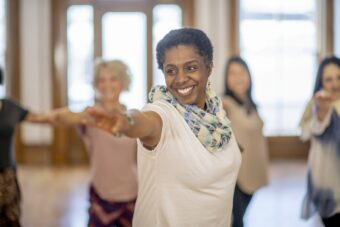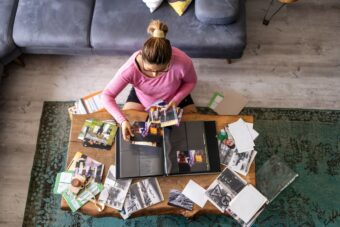This advice on keeping active, by occupational therapist Caroline Clarke, was originally written for people who were shielding or isolating during the Covid pandemic.
Although older people will have to stay at home, it is vital that they keep moving. (And we’d add that this applies to everyone, not just older people!)
As we age, we naturally lose muscle mass at a steady rate and this accelerates past the age of 75.
‘However, even a short period of sedentary living can dramatically increase this decline,’ says Caroline Clarke, an occupational therapist at Age UK.
A 2018 study published in the Journal of Physiology, found that healthy older people who were inactive for two weeks had pronounced loss of muscle mass in their lower limbs.
To avoid this, aim to get up on your feet at least once an hour. Some fitness watches will prompt you to do this, or you can set a timer to remind you.
‘If you have a garden, take a stroll for ten minutes several times each day,’ says Caroline. ‘Try to walk briskly until you feel a little warmer and your breathing rate rises slightly.
‘Or, when waiting for the kettle to boil, for example, go up on your toes ten times in a row while holding on to something like the kitchen sink.’
Yoga
Yoga is a great all-round exercise, which can help mobility and well as contributing to peace of mind. It’s an excellent way to loosen and stretch painful muscles, reduce stress, and improve circulation. The benefits also include better breathing habits, better sleep and an overall sense of well-being.
If you struggle with flexibility or balance, chair yoga is a great way to get some of the wonderful health benefits of yoga – being seated means that even those who aren’t flexible can safely do the exercises.
Want to give yoga a try? Check out these brilliant videos created for us by Allison Harrison from Hot Yoga, Edinburgh:

Here are some other ways to keep active or use your home as a gym to stay fit:
- Stair climbing works your heart, lungs and leg muscles.
- Japanese research found that using the stairs for two sets of three minutes in the one to two hours after eating lowered blood sugar levels in those with type 2 diabetes.
- Canadian research suggests even climbing just one flight of stairs daily makes your brain 0.58 years younger.
- Personal trainer Elliot Upton, from global training group Ultimate Performance, says: ‘Even taking side steps while holding the bannister challenges the body in different ways.’
- If you don’t have stairs, try marching on the spot.
- ‘Pushing against something that won’t move while you also don’t move creates what’s known as an isometric contraction of the muscle,’ says personal trainer Ollie Campbell from Priority 6 in Oxford.
- Isometric exercises help maintain muscle mass and can be particularly good for people recovering from injury or with problems such as arthritis, which can affect movement and lower blood pressure.
- She suggests a couple of simple moves to get you started.
- First, stand with feet 2 inches away from the wall, hands pressed against it in an upright press-up position. Lean forward and push and hold for ten seconds. Now, move your feet back another 2 inches and repeat the hold. Keep moving back until you reach the point when you start with straight arms.
- ‘A backpack filled with books can act like a weighted vest,’ says Surrey-based trainer Tanya White. ‘You can climb up the stairs with it on, or perform lunges, squats or push-ups.’
- Edinburgh-based trainer Nicole Wright prefers to raid her kitchen for makeshift weights. ‘I have a heavy Le Creuset pan that I have been known to use in a workout. It’s good for side bends, targeting the oblique muscles. Or I squat, grab it and then raise it straight over my head before repeating.’
AGE UK has a free exercise video appropriate for all older people who want to work out at home. It and other fitness workouts can be downloaded from www.generationgames.org.uk.
Other ways to stay active
If you need to self-isolate, you may find that you are not as active as usual. Try and ensure you can get some exercise walking round your garden, join online exercise groups, or see some of our movement advice and yoga videos – but watch that you don’t snack too much if you are bored or sitting around. Find something to distract yourself. Maybe use this unexpected free time to do those jobs you have kept putting off for a rainy day – like tidying cupboards, sorting photos, organising your wardrobe – or keep in touch with friends using technology (online Scrabble is great!).

You may find these useful:
Get information
If you've just been diagnosed with vasculitis, we can help you with information about your condition and treatments.
Get support
If you're affected by vasculitis, we can help. We offer a range of practical and emotional support.
Get involved
Donate, fundraise, volunteer or take part. Help us support people with vasculitis.